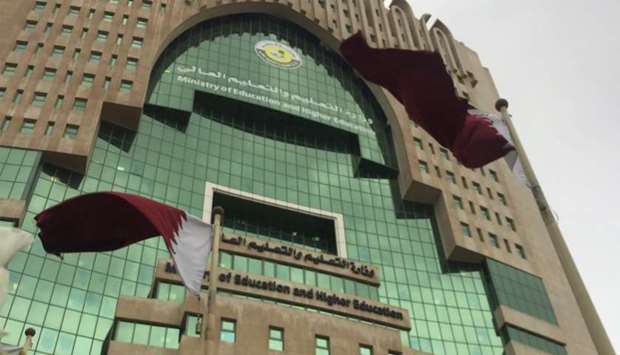The constantly rising fees charged by many private schools have become a concern for many parents who are forced to transfer their children from one school to another due to such “unjustifiable” hike in fees.
Speaking to local Arabic daily Arrayah, a number of Qatari parents have voiced their concerns that the fees of many private schools across the country at all the educational stages have become unreasonable, as many parents pay over QR15,000 for each student, on top of the value of the educational coupons they get, for one school year.
Accordingly, they have asked the Ministry of Education and Higher Education (MoEHE) to intervene and curb these hikes in private school fees, and stop the schools from becoming for-profit entities, as some of these keep increasing fees considerably year after year.
They also asked the ministry to offer subsidies and support their needs, such as transportation and textbooks.
Currently, there are over 332 different private schools in Qatar offering various curricula, and the MoEHE offers citizens educational coupons worth QR28,000 per student each year, payable in two installments to the schools enrolled in the educational coupons system.
Salem al-Kuwari wonders why the fees for a child aged less than five years should be QR40,000 a year, even though the standard of education is not up to the expectations of parents.
He stressed that the educational services offered by these schools are not worth the fees they charge, and yet they keep increasing them without any considerable improvements in the services offered.
Al-Kuwari also said that private school fees in Qatar are the highest in the GCC region, and called on the ministry to address this issue decisively.
Mohamed al-Bakr said that while this is inevitable as private schools aim to make profit, some of them compromise on quality to maximise profit.
He suggested that the government support good schools to encourage them to charge reasonable rates.
The support could be in the form of school buildings, transportation solutions, and exemptions from paying certain service fees and other administrative fees.
Al-Bakr said that in this way the issue of rising school fees could be controlled practically.
Abdulhadi al-Marri stressed that he has not seen any improvement in the services of many of the schools over the past two years, and still they ask for fees hikes, which he said is not justifiable in terms of services and quality of education.
Besides, some of these schools have hidden fees and collect money throughout the school year, which parents have to pay.
Mohamed al-Azba pointed out that the increasing school fees have become a concern for all households in the country.
Accordingly, he said parents' complaints and demands have been voiced constantly to seek a reduction of these fees, or put a limit to them to avoid placing additional burden on families.
Speaking to local Arabic daily Arrayah, a number of Qatari parents have voiced their concerns that the fees of many private schools across the country at all the educational stages have become unreasonable, as many parents pay over QR15,000 for each student, on top of the value of the educational coupons they get, for one school year.
Accordingly, they have asked the Ministry of Education and Higher Education (MoEHE) to intervene and curb these hikes in private school fees, and stop the schools from becoming for-profit entities, as some of these keep increasing fees considerably year after year.
They also asked the ministry to offer subsidies and support their needs, such as transportation and textbooks.
Currently, there are over 332 different private schools in Qatar offering various curricula, and the MoEHE offers citizens educational coupons worth QR28,000 per student each year, payable in two installments to the schools enrolled in the educational coupons system.
Salem al-Kuwari wonders why the fees for a child aged less than five years should be QR40,000 a year, even though the standard of education is not up to the expectations of parents.
He stressed that the educational services offered by these schools are not worth the fees they charge, and yet they keep increasing them without any considerable improvements in the services offered.
Al-Kuwari also said that private school fees in Qatar are the highest in the GCC region, and called on the ministry to address this issue decisively.
Mohamed al-Bakr said that while this is inevitable as private schools aim to make profit, some of them compromise on quality to maximise profit.
He suggested that the government support good schools to encourage them to charge reasonable rates.
The support could be in the form of school buildings, transportation solutions, and exemptions from paying certain service fees and other administrative fees.
Al-Bakr said that in this way the issue of rising school fees could be controlled practically.
Abdulhadi al-Marri stressed that he has not seen any improvement in the services of many of the schools over the past two years, and still they ask for fees hikes, which he said is not justifiable in terms of services and quality of education.
Besides, some of these schools have hidden fees and collect money throughout the school year, which parents have to pay.
Mohamed al-Azba pointed out that the increasing school fees have become a concern for all households in the country.
Accordingly, he said parents' complaints and demands have been voiced constantly to seek a reduction of these fees, or put a limit to them to avoid placing additional burden on families.

